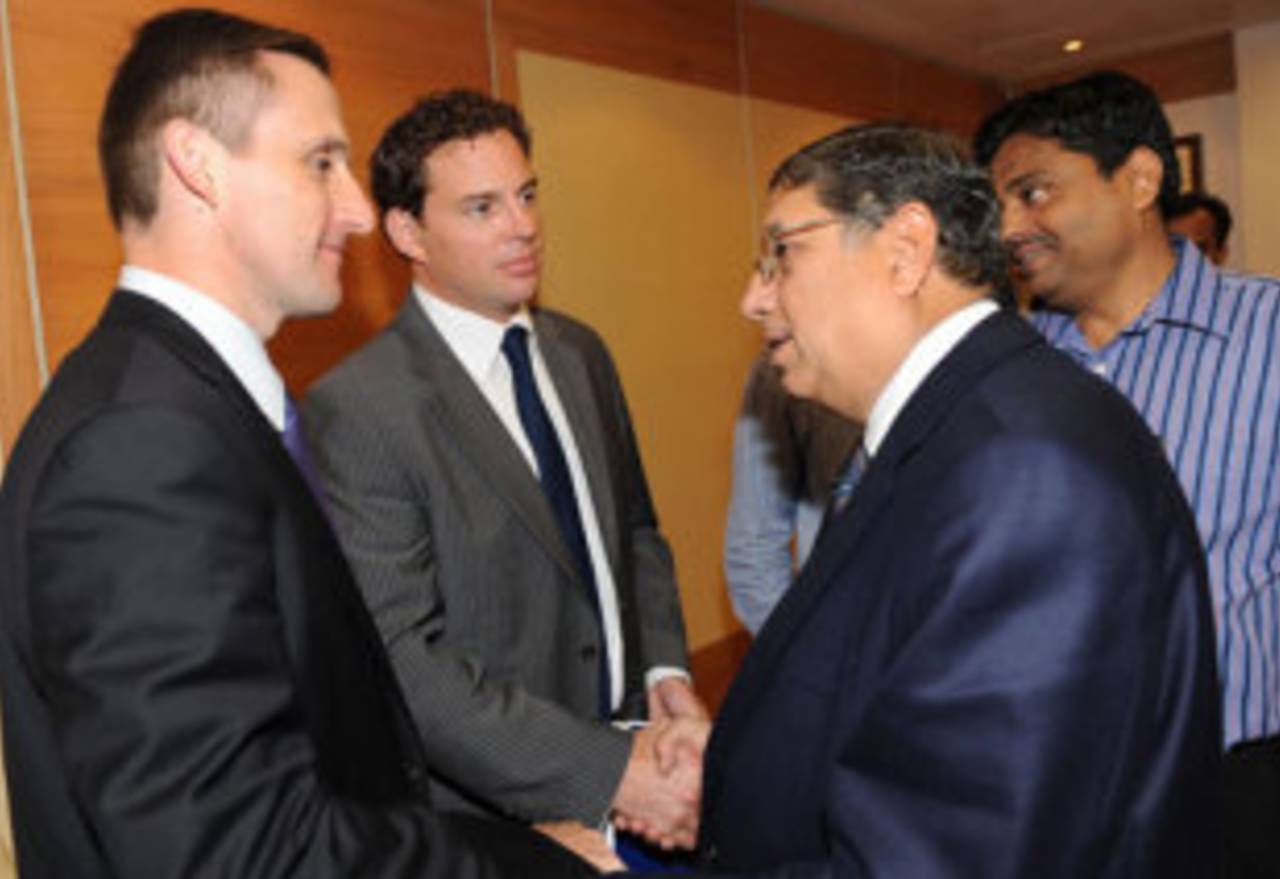Every once in a while the Indian cricket board takes a break from its primary activity, turning the game and itself into even bigger brands, and indulges in its favourite secondary, physical, activities - jerking its knee and flexing its muscle. This atavistic trait doesn't show up only when there is a grand threat - perceived or otherwise - to its powers and position. It can happen when the BCCI is merely irritated. As in the
latest case concerning the dope-testing protocol.
The issue is simple: With drug abuse becoming an increasing threat to sport, cricket - to be clean, and to be seen as clean - needs a dope-testing protocol. There is one currently used across the world, by almost every sporting body, devised and administered by the acknowledged nodal organisation. It is not flawless and it has its critics - as perhaps any protocol cutting such a wide swathe will - but it is the law. And the world's leading sportsmen follow it, even as some of them complain bitterly about it.
But not India's cricketers. And not India's cricket board.
The players reportedly raised concerns when informed about the requirements, during the tour of New Zealand earlier this year, and when the time came to sign the protocol refused to do so (for these players are nothing if not proud products of the board they represent). And so as the deadline came and went, and India's cricketers remained the only ones in the world not to have signed, the board went on the defensive. Which meant the offensive. And so the knee jerk and the muscle flex.
As an immediate reaction it offered a two-pronged argument against the players signing up. On the one hand, it wondered whether there really was any need for cricket to join a broad-spectrum testing protocol; instead, cricket should, the board said, fashion a customised set of rules taking into account the peculiarities of the game and focusing on testing during camps and series or tournaments instead of 24/7/365. On the other, it
trotted out a set of specific reasons why their 11 players should not sign the current protocol, and even invoked the Constitution of India and its guarantee of privacy.
By mooting a doping code outside of WADA, the BCCI is effectively asking the ICC to take cricket out of the global sporting family and exist as a sort of renegade unit. It's not really a request, given that 70% of the money in world cricket comes from India
One would be tempted to dismiss this as nonsense but for the gravity of the situation. By mooting a doping code outside of WADA, the BCCI is effectively asking the ICC to take cricket out of the global sporting family and exist as a sort of renegade unit. It's not really a request, given that 70% of the money in world cricket comes from India. So it is not nonsensical but hugely irresponsible.
One can see where the board is coming from - cricket in India is not really a sport; it exists outside the framework that covers every other sport in the country. It does not need government funding; on the contrary, it is itself a donor to other sports - Wednesday's newspapers reported how India's football federation has sought a grant from the BCCI for an ambitious development project. The BCCI is larger than sport itself in this country and so believes that it can exist in precisely the same way in the global community. And so it might, too: the sport has a unique, captive fan base, while the IPL has opened up new avenues for bringing in finances - streets paved with gold.
Yet there is the obligation for the BCCI to act as the leader, to sometimes bend for the greater good, to acquire an identity higher than that of a purely commercial enterprise. Time and again, when it perceives a threat to its superiority, it has raised the stakes to an impossible level; the latest example was
in Sydney in 2008 when it had an umpire replaced, and prepared to risk an entire series over one bad Test. It seems to be heading down the same road now, in the face of advice, suggestions, entreaties and the odd bit of ridicule from across the sporting spectrum.
The irony is that it has fairly simple solutions at hand. The problem is a simple one, of managing players' schedules. The BCCI can, without the slightest dent to its coffers, appoint a minion to coordinate the whereabouts of nine cricketers (one imagines the two women are really not a problem here) and send the necessary emails and text messages to the WADA officials concerned. It is a decision that takes a minute to approve and is a trifle to implement. Perhaps it is too easy.
If the board's actions sound irresponsible, the stand taken by the players is ludicrous. They, too, are leaders in their field, respected by their peers, and most importantly, are role models for millions of youth. They are not unlike other global stars like Roger Federer and Rafael Nadal, just two of sport's big names to sign on the dotted line. It is also disingenuous of Yuvraj Singh
to claim that cricketers are a unique breed with a more itinerant lifestyle than other sportsmen. Actually, it is plain rubbish, as any tennis player or golfer, whose schedule depends on how far he progresses in each tournament, will tell you.
If cricket wants to be taken as a global sport and move beyond its identity as an extension of the Commonwealth, it needs to exist in the global family. It needs the validation and the vehicle of the Olympic movement and its offshoots to permeate uncharted territories. Twenty20 is a prime candidate for an Olympic sport, yet it will not make the breakthrough unless the ICC and IOC - and the BCCI - play ball.
